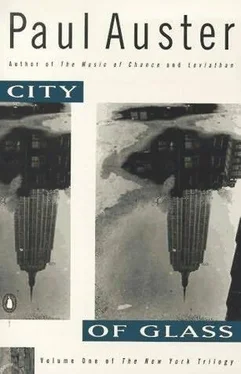Paul Auster - City of Glass
Здесь есть возможность читать онлайн «Paul Auster - City of Glass» весь текст электронной книги совершенно бесплатно (целиком полную версию без сокращений). В некоторых случаях можно слушать аудио, скачать через торрент в формате fb2 и присутствует краткое содержание. Жанр: Современная проза, на английском языке. Описание произведения, (предисловие) а так же отзывы посетителей доступны на портале библиотеки ЛибКат.
- Название:City of Glass
- Автор:
- Жанр:
- Год:неизвестен
- ISBN:нет данных
- Рейтинг книги:5 / 5. Голосов: 1
-
Избранное:Добавить в избранное
- Отзывы:
-
Ваша оценка:
- 100
- 1
- 2
- 3
- 4
- 5
City of Glass: краткое содержание, описание и аннотация
Предлагаем к чтению аннотацию, описание, краткое содержание или предисловие (зависит от того, что написал сам автор книги «City of Glass»). Если вы не нашли необходимую информацию о книге — напишите в комментариях, мы постараемся отыскать её.
City of Glass — читать онлайн бесплатно полную книгу (весь текст) целиком
Ниже представлен текст книги, разбитый по страницам. Система сохранения места последней прочитанной страницы, позволяет с удобством читать онлайн бесплатно книгу «City of Glass», без необходимости каждый раз заново искать на чём Вы остановились. Поставьте закладку, и сможете в любой момент перейти на страницу, на которой закончили чтение.
Интервал:
Закладка:
His third problem was shelter, but this was more easily solved than the other two. Fortunately, the weather remained warm, and as late spring moved into summer, there was little rain. Every now and then there was a shower, and once or twice a downpour with thunder and lightning, but all in all it was not bad, and Quinn never stopped giving thanks for his luck. At the back of the alley there was a large metal bin for garbage, and whenever it rained at night Quinn would climb into it for protection. Inside, the smell was overpowering, and it would permeate his clothes for days on end, but Quinn preferred it to getting wet, for he did not want to run the risk of catching cold or falling ill. Happily, the lid had been bent out of shape and did not fit tightly over the bin. In one comer there was a gap of six or eight inches that formed a kind of air hole for Quinn to breathe through-sticking his nose out into the night. By standing on his knees on top of the garbage and leaning his body against one wall of the bin, he found that he was not altogether uncomfortable.
On clear nights he would sleep under the bin, positioning his head in such a way that the moment he opened his eyes he could see the front door of the Stillmans' building. As for emptying his bladder, he usually did this in the far comer of the alley, behind the bin and with his back to the street. His bowels were another matter, and for this he would climb into the bin to ensure privacy. There were also a number of plastic garbage cans beside the bin, and from one of these Quinn was usually able to find a sufficiently clean newspaper to wipe himself, although once, in an emergency, he was forced to use a page from the red notebook. As for washing and shaving, these were two of the things that Quinn learned to live without.
How he managed to keep himself hidden during this period is a mystery. But it seems that no one discovered him or called his presence to the attention of the authorities. No doubt he learned early on the schedule of the garbage collectors and made sure to be out of the alley when they came. Likewise the building superintendent, who deposited the trash each evening in the bin and the cans. Remarkable as it seems, no one ever noticed Quinn. It was as though he had melted into the walls of the city.
The problems of housekeeping and material life occupied a certain portion of each day. For the most part, however, Quinn had time on his hands. Because he did not want anyone to see him, he had to avoid other people as systematically as he could. He could not look at them, he could not talk to them, he could not think about them. Quinn had always thought of himself as a man who liked to be alone. For the past five years, in fact, he had actively sought it. But it was only now, as his life continued in the alley, that he began to understand the true nature of solitude. He had nothing to fall back on anymore but himself. And of all the things he discovered during the days he was there, this was the one he did not doubt: that he was falling. What he did not understand, however, was this: in that he was falling, how could he be expected to catch himself as well? Was it possible to be at the top and the bottom at the same time? It did not seem to make sense.
He spent many hours looking up at the sky. From his position at the back of the alley, wedged in between the bin and the wall, there were few other things to see, and as the days passed he began to take pleasure in the world overhead. He saw that, above all, the sky was never still. Even on cloudless days, when the blue seemed to be everywhere, there were constant little shifts, gradual disturbances as the sky thinned out and grew thick, the sudden whitenesses of planes, birds, and flying papers. Clouds complicated the picture, and Quinn spent many afternoons studying them, trying to learn their ways, seeing if he could not predict what would happen to them. He became familiar with the cirrus, the cumulus, the stratus, the nimbus, and all their various combinations, watching for each one in its turn, and seeing how the sky would change under its influence. Clouds, too, introduced the matter of color, and there was a wide range to contend with, spanning from black to white, with an infinity of grays between. These all had to be investigated, measured, and deciphered. On top of this, there were the pastels that formed whenever the sun and the clouds interacted at certain times of day. The spectrum of variables was immense, the result depending on the temperatures of the different atmosphere levels, the types of clouds present in the sky, and where the sun happened to be at that particular moment. From all this came the reds and pinks that Quinn liked so much, the purples and vermilions, the oranges and lavenders, the golds and feathery persimmons. Nothing lasted for long. The colors would soon disperse, merging with others and moving on or fading as the night appeared. Almost always there was a wind to hasten these events. From where he sat in the alley, Quinn could rarely feel it, but by watching its effect on the clouds, he could gauge its intensity and the nature of the air it carried. One by one, all weathers passed over his head, from sunshine to storms, from, gloom to radiance. There were the dawns and dusks to observe, the midday transformations, the early evenings, the nights. Even in its blackness, the sky did not rest. Clouds drifted through the dark, the moon was forever in a different form, the wind continued to blow. Sometimes a star even settled into Quinn's patch of sky, and as he looked up he would wonder if it was still there, or if it had not burned out long ago.
The days therefore came and went. Stillman did not appear. Quinn's money ran out at last. For some time he had been steeling himself for this moment, and towards the end he hoarded his funds with maniacal precision. No penny was spent without first judging the necessity of what he thought he needed, without first weighing all the consequences, pro and con. But not even the most stringent economies could halt the march of the inevitable.
It was some time in mid-August when Quinn discovered that he no longer could hold out. The author has confirmed this date through diligent research. It is possible, however, that this moment occurred as early as late July, or as late as early September, since all investigations of this sort must make allowances for a certain margin of error. But, to the best of his knowledge, having considered the evidence carefully and sifted through all apparent contradictions, the author places the following events in August, somewhere between the twelfth and twenty-fifth of the month.
Quinn had almost nothing now-a few coins that amounted to less than a dollar. He was certain that money had arrived for him during his absence. It was simply a matter of retrieving the checks from his mailbox at the post office, taking them to the bank, and cashing them. If all went well, he could be back to. East 69th Street within a few hours. We will never know the agonies he suffered at having to leave his spot.
He did not have enough money to take the bus. For the first time in many weeks, then, he began to walk. It was odd to be on his feet again, moving steadily from one place to the next, swinging his arms back and forth, feeling the pavement under the soles of his shoes. And yet there he was, walking west on 69th Street, turning right on Madison Avenue, and beginning to make his way north. His leks were weak, and he felt as though his head were made of air. He had to stop every now and then to catch his breath, and once, on the brink of failing, he had to grab hold of a lamp post. He found that things went better if he lifted his feet as little as possible, shuffling forward with slow, sliding steps. In this way he could conserve his strength for the comers, where he had to balance himself carefully before and after each step up and down from the curb.
Читать дальшеИнтервал:
Закладка:
Похожие книги на «City of Glass»
Представляем Вашему вниманию похожие книги на «City of Glass» списком для выбора. Мы отобрали схожую по названию и смыслу литературу в надежде предоставить читателям больше вариантов отыскать новые, интересные, ещё непрочитанные произведения.
Обсуждение, отзывы о книге «City of Glass» и просто собственные мнения читателей. Оставьте ваши комментарии, напишите, что Вы думаете о произведении, его смысле или главных героях. Укажите что конкретно понравилось, а что нет, и почему Вы так считаете.












